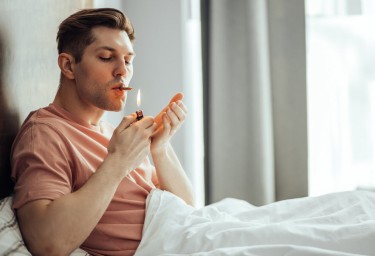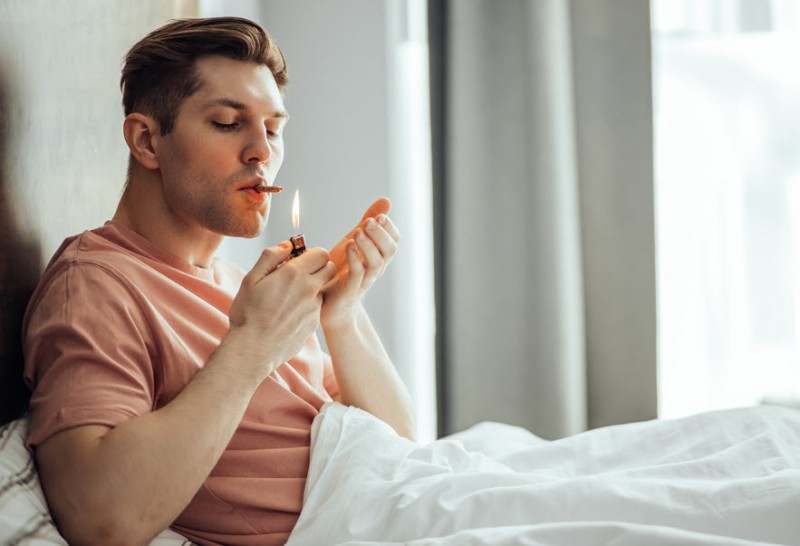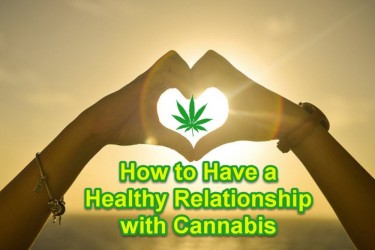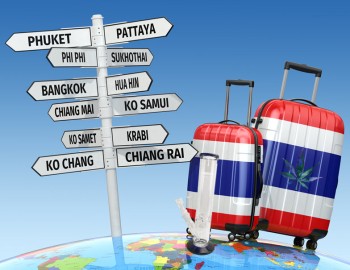
Reddit Post - 33 years using cannabis and how it ruined my life
Hi, my name is Reginald and I’ve been smoking cannabis for over twenty years. I am not an addict. On the contrary, over the years of smoking cannabis, I have actually cut back and now enjoy cannabis in different configurations.
Sometimes I take tolerance breaks (which for me isn’t a difficult thing to do) – and other times I wake and bake and toss away any form of productivity – simply enjoying the day. There are millions like me. People who consume cannabis on the regular and have no intrinsic problem with the habit.
Do I feel “withdrawal symptoms” when I stop smoking weed. Of course! There’s a physiological change that occurs in my body – but to be honest, I would react the same way if I stop drinking coffee, eating sugar, or eating meat.
When you engage with a particular food or substance over a long time, your body adjusts and acclimatizes to the chemical profile introduced into your organism. When you abruptly remove it, or reduce it – the body notices.
This doesn’t mean I’m addicted.
I know addiction. I’ve been addicted to tobacco. I’ve found myself in a gaming hole of shame – spending money and time on something that provided no real value to my life.
But I can’t say the same for cannabis.
For me, cannabis has helped me through some rough times and while people may like to say, “You’re using weed as a crutch!” while they snarf down their clonazepam just to get through their day – for me cannabis provided some breathing room in dire emotional situations.
Is my example applicable to everyone?
Of course not!
I read a recent Reddit post on the subreddit /leaves –which basically are a bunch of people who are quitting weed talking to each other for support.
For this one guy, weed wasn’t something that took the edge of, it was the way of engaging with life all the time.
A Redditors tale…
The following is a post left by Redditor /WeDontNeedNoRoads. During the following dynamic we’ll be listening to his story while simultaneously analyzing the reasoning of the author in relation to his (or her) self-reflection.
I don’t do this to bash the Redditor, but rather to use it as a case study on the reasoning of individual in relation to their own pain and how we as humans tend to cast ourselves in a light which removes us from responsibility. This also isn’t saying that what the Redditor is experiencing wasn’t painful, difficult or true.
Within the subjective experience of the infinite expression that is humanity – “We Don’t Need No roads’” personal dance with cannabis made him conclude in this manner. To this person, their struggle with cannabis is real because of their conclusions of their own experiences.
Also, it’s important to note that I added the emphasis within the paragraphs yet aside from that, did not change anything. I will be posting a paragraph in italics and comment beneath each paragraph.
Let’s begin…
I’m 49 and have been a daily smoker since I was 16. I spent decades of having to smoke weed several times a day just to avoid going into fight or flight panic mode and to treat the chronic insomnia I thought I had, and my social anxiety got so crippling that I would sweat profusely and my heart would race when even thinking about an upcoming social interaction. It got so bad that I’ve lost most of my lifelong friends. I couldn’t even talk to them on the phone without major anxiety and eventually they drifted away. I became a complete wreck, came to hate being awake as it was so stressful just to exist.
Here the author mentions that they were smoking cannabis since the age of sixteen several times per day to just “avoid going into fight or flight mode” meaning that the person’s nervous system was stuck in the sympathetic mode and wasn’t able to regulate naturally to the parasympathetic mode.
When they smoked cannabis, it helped them shift from the sympathetic to the parasympathetic. This was also the reason why the author had insomnia – if you can’t enter into “Rest/Digest” mode then you won’t be sleeping very profoundly.
A lack of sleep has some profound side effects and occurs rather quickly. Here’s a short list of side effects of a lack of sleep published by the Cleveland Clinic.
-
Lack of alertness. Even missing as little as 1.5 hours can have an impact on how you feel.
-
Excessive daytime sleepiness. It can make you very sleepy and tired during the day.
-
Impaired memory. Lack of sleep can affect your ability to think, remember and process information.
-
Relationship stress. It can make you feel moody and you can become more likely to have conflicts with others.
-
Quality of life. You may become less likely to participate in normal daily activities or to exercise.
-
Greater likelihood for car accidents. Drowsy driving accounts for thousands of crashes, injuries and fatalities each year, according to the National Highway Traffic Safety Administration.
Lack of sleep also impairs your judgment, it affects critical thinking and mood regulation and affects every other part of your physiology in one way or another.
Furthermore, the author speaks about their “social anxiety” which is a psychological disorder. A question that comes to my mind is, “was this person taking psychiatric treatment?” and was this person drinking at the same time they were smoking? Which came first? The Alcohol or the cannabis?
It’s obvious by admission of the author that the individual had some diagnosed or undiagnosed psychological disorder which could have stemmed from some sort of early childhood trauma that has been suppressed by the unconscious mind. Or perhaps his home environment wasn’t stable…these are all speculations of course, but a healthy person from a stable home environment rarely tends to develop “crippling social anxiety”.
You can see that this person had a degree of severity in relation to their mental illness due to the fact that even thinking about interactions or talking on the phone was enough to give them panic attacks. Yet instead of facing it, dealing with it…the author allegedly used drugs (not just cannabis) to mask the symptoms best s/he could. Self-medication is a common reaction from people suffering with mental illness.
Now that we have some sort of backstory, let’s continue to the more recent developments…
2 weeks ago I stopped all substances, caffeine, alcohol, cannabis, and have been forcing myself to go to the gym almost every day. It has been a roller coaster of emotions, I’ve cried frequently, not been able to sleep for several nights straight, my heat tolerance has gone haywire, and I haven’t been able to eat much. A lot of pain, basically. But in the last 3-4 days, I have started to become a different person. I feel more engaged and alive, my anxiety has fallen though the floor, I’m sleeping 8h straight and my appetite has returned with a vengeance. I now see that I was using cannabis to treat problems that were created by using cannabis in the first place, a vicious cycle which I’ve somehow not been able to see until almost 50 years old.
During this paragraph we can see the self-reported changes implement in the life of the author. Firstly, the elimination of “all substances/drugs” which includes caffeine, alcohol and cannabis…the author also made a lifestyle change by going to the gym.
As a result, the individual has been going through some sort of purge in their system. Quitting coffee is hardcore…and if you’re dependent on cannabis or alcohol, that would be true too. The author was most likely a heavy consumer of all substances, and thus an abrupt interruption of regular doses would have a severe physiological reaction.
Things like insomnia, pain, lack of appetite….are symptoms of alcohol withdrawal. Similarly, caffeine is a hardcore drug…in facts, it is the world’s most consumed legal drug.
We are more dependent on the substance than we’d like to admit as a society…and withdrawal from caffeine also can be nerve-wrecking. All of the symptoms mentioned seem to be related more to the “purging of the system” from decades of dependence than anything else.
Then, the author notes a change occur…roughly between 10-14 days, which would be a good period for the body to eliminate a lot of toxins and recalibrate the endogenous chemical profile for baseline existence. In other words, at this point most addictions are “broken” and the rest is mainly an issue of willpower and psychology.
Fortunately, the author supplanted the lack of drugs with exercise, which is a good thing. However, considering the previously mentioned (un)diagnosed mental condition – even exercise could become the next “drug” since it would provide dopamine spikes and technically generate more endocannabinoids. Of course, this type of addiction can be beneficial to a person if managed correctly.
However, going to the gym isn’t addressing the core reasons why you have social anxiety, you’re not peering into the shadow parts of the self to figure out “what went wrong”. It’s still a mechanism of avoidance, albeit a much healthier and beneficial means.
Which is why the person is feeling like a different person. This is because the author is becoming a different person. Whatever it is you are doing, is making you into something.
If you eat donuts every day…you’re becoming fat. If you jog 5-miles every day – you’re becoming fitter. If you drink a six pack of Coors daily, you’re becoming an alcoholic.
The author is becoming someone else, and neurologically speaking – this is starting to rewire the brain to create a new “you”. During this phase, you can experience a type of euphoria akin to falling in love or earnestly forming part of a new religion…
Let’s continue…
If only I had recognised what I was doing to myself decades ago, my life would have been quite different. I am resolute that I will never touch cannabis again, most likely stop consuming alcohol too. Life is beginning to feel enjoyable for the first time since I was a teenager.
I agree with the author…if they only were able to recognize that utilizing any substance or activity to cover up the internal hurt and hidden traumas, only makes the trauma manifest in other ways. With some exploration, they could even discover that the trauma wasn’t even their own – yet if you’re stoned or drunk or busy all the time…you can’t get quiet enough to peer into the darkness.
It’s true, “if” we “could have” changed things in the past life “would have” been very different. Or not.
In my opinion this is the “addict’s trap” where they imagine a life where they “could have” performed better than they did because “FILL IN THE BLANK” was keeping them from achieving their goals. Yet that isn’t true now is it.
Sure, if you’re experiencing a crippling addiction…it may play a role in your poor performance but it was a lack of self-awareness that didn’t allow them to make appropriate changes. They are stuck on autopilot allowing the body to make most important decisions…fearing the hypothetical pain they would have to suffer if they were to disrupt their behavior.
It’s easier to crawl back into the bottle or snort a line than it is to sit with your pain and face it. But it’s also not your fault.
We’re not taught on how to deal with our emotions in society. We don’t learn it in school, we have no examples of it on television. We view life through the lens of fictionalized reality, where vertical framed videos show us the “lives” of others – with as many filters and emojis your heart can desire.
Desperately we want to see, eat, feel anything other than to sit quietly and hear the whispers of the infinite void within. The fact that the author is still drinking alcohol yet managed to “get rid of weed” suggests to me that the author was more of an alcoholic than a stoner.
Nonetheless, I’m glad that this individual is finding a path to self-realization and I wish him the best…
BUT…
Don’t be me. Stop now and don’t look back. I wish with all my heart that I’d never tried cannabis when I was 16. I was a semi functioning drug addict for 33 years without even realising it, and have lost the best years of my life to this insidious drug.
The author is missing the point. Cannabis didn’t ruin your life. You didn’t lose the “best years of your life”. All of this is exactly the type of thinking you’ll need to one day crawl back into a bottle and smoke some dank to take the edge off.
The problem here is that the author is externalizing her issues and projecting it onto cannabis. The “evil cannabis” is to blame for all of my past decisions. I was helpless against it...there was nothing I could do…until I did something.
The responsibility shifts away from the person because we like to be cast as either heroes or victims in our life – rarely the villain.
Unless the author is currently undergoing some sort of internal healing – these problems will manifest in some other way. Now, let’s end this piece by taking a look at how you can maintain a healthy relationship with cannabis and enjoy the benefits for decades without being a “semi-functioning drug addict”.
How to have a healthy relationship with cannabis
First of all, if you have been smoking for several years or even decades – that doesn’t mean that you are an addict. In fact, the vast majority of people who consume cannabis tend to down regulate consumption over the years.
While it’s true that cannabis can be a problem for some, for most people if you have to choose between sobriety and getting stoned because you have a lot of important things to do – productivity wins 9/10 times.
In every state that has legalized cannabis, productivity hasn’t gone down…in fact, fewer people are using sick days.
If you want to have a healthy relationship with cannabis, you must always have a healthy relationship with yourself first. This means becoming mindful of your behavior, thoughts, and emotions. About peering into the darkness of your soul and seeing which hidden traumas are influencing your life from within.
Cannabis can be used to cover up those pains for a short period of time, but unless you’re actually on a journey of self-discovery…suppressing your past pains will only manifest in unplanned manners. Use cannabis for self reflection.
I have been smoking for more than twenty years, but I often smoke a joint and remember the painful things in my life. I sit with the pain, and the cannabis helps me from getting consumed by it. It gives me that space where I can reflect and integrate, where I can do the necessary work to move forward.
But this is because I’m on an almost “holy quest” of self-discovery where the conflict, pains and challenges in my life are simply an opportunity to remedy something that has been hidden from me until now.
As for the author of the Reddit post, I only wish the best for their lives. At the end of the day, if they found a path to self-fulfillment and needs to demonize cannabis to remain true to the path…then cannabis can do that for you as well. Some people will reject this approach, others will embrace it and both of them would be correct if it serves the bottom line.






